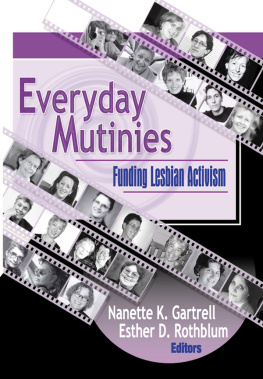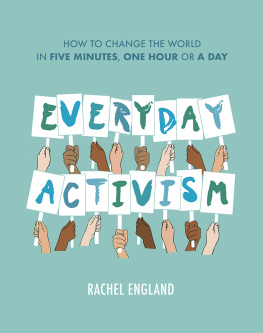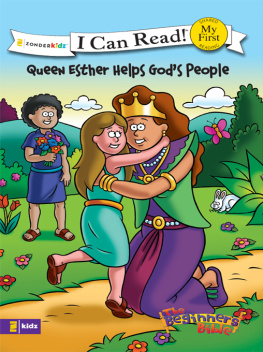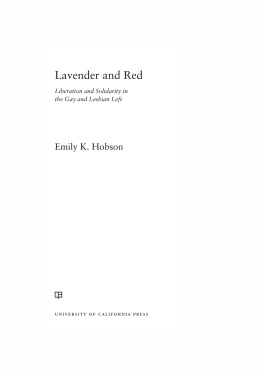Everyday Mutinies: Funding Lesbian Activism
Everyday Mutinies: Funding Lesbian Activism has been co-published simultaneously as Journal of Lesbian Studies, Volume 5, Number 3 2001.
First published by
The Haworth Press, Inc.
10 Alice Street
Binghamton, N Y 13904-1580
This edition published 2012 by Routledge
| Routledge | Routledge |
| Taylor & Francis Group | Taylor & Francis Group |
| 711 Third Avenue | 2 Park Square, Milton Park |
| New York, NY 10017 | Abingdon, Oxon OX14 4RN |
Everyday Mutinies: Funding Lesbian Activism has been co-published simultaneously as Journal of Lesbian Studies, Volume 5, Number 3 2001.
2001 by The Haworth Press, Inc. All rights reserved. No part of this work may be reproduced or utilized in any form or by any means, electronic or mechanical, including photocopying, microfilm and recording, or by any information storage and retrieval system, without permission in writing from the publisher.
The development, preparation, and publication of this work has been undertaken with great care. However, the publisher, employees, editors, and agents of The Haworth Press and all imprints of The Haworth Press, Inc., including The Haworth Medical Press and The Pharmaceutical Products Press, are not responsible for any errors contained herein or for consequences that may ensue from use of materials or information contained in this work. Opinions expressed by the author(s) are not necessarily those of The Haworth Press, Inc.
Cover design by Jennifer M. Gaska
Library of Congress Cataloging-in-Publication Data
Everyday mutinies : funding lesbian activism / Nanette K. Gartrell, Esther D. Rothblum, editors.
p. cm.
Co-published simultaneously as Journal of lesbian studies, volume 5, number 3 2001.
Includes bibliographical references and index.
ISBN 1-56023-258-7 (alk. paper) ISBN 1-56023-259-5 (alk. paper)
1. LesbiansUnited StatesPolitical activity. 2. Fund raisingUnited States. 3. Gay rightsUnited States. I. Gartrell, Nanette. II. Rothblum, Esther D.
HQ75.6.U5 E84 2001
305.489664dc21
2001039490
Everday Mutinies: Funding Lesbian Activism
CONTENTS
ngela Pattatucci-Aragn
Alison Bechdel
Marny Hall
Joan E. Biren
Gayle E. Pitman
Judith Bradford
J. Alison Hilber
Tee A. Corinne
Elana Dykewomon
Marcia M. Gallo
Nanette K. Gartrell
Jewelle Gomez
Amanda Kovattana
Barbara Grier
Rhonda J. Factor
Kate Kendell
Ruth Herring
Kathy Levinson
Karen L. Erlichman
Del Martin
Phyllis Lyon
Dee Mosbacher
Kimberly F. Balsam
Marcia Munson
Martina Navratilova
Nanette K. Gartrell
Caitlin Ryan
Diane Sabin
Jessica F. Morris
Boden Sandstrom
Charlene Vetter
Sherry Thomas
Marcia Perlstein
Lonie Walker
Ingrid Sell
ABOUT THE EDITORS
Nanette K. Gartrell, MD, was the first out lesbian physician on the Harvard Medical School faculty. She is currently Associate Clinical Professor of Psychiatry at the University of California, San Francisco, and has a private psychotherapy practice in that city. She has been documenting sexual abuse by physicians since 1982 and conducting a longitudinal study of lesbian families since 1986. She is the editor of Bringing Ethics Alive: Feminist Ethics for Psychotherapy Practice (Harrington Park Press). In 1999, Dr. Gartrell received the LAVA award for Lesbians of Action, Vision, and Achievement.
Esther D. Rothblum, PhD, is Professor of Psycholoy at the University of Vermont, and Editor of the Journal of Lesbian Studies. She is a past president of the Society for the Psychological Study of Lesbian, Gay, and Bisexual Issues-Division 44 of the American Psychological Association. Dr. Rothblum has edited 23 books, including Lesbian Friendships and Boston Marriages: Romantic but Asexual Relationships Among Lesbians.
Who are the women who struggled to form lesbian communities and how did they fund their activism? In this volume, two dozen lesbians tell the stories of their activism, with an emphasis on how they support themselves and fund their political activities. Less than 0.3% of all philanthropic dollars are awarded to lesbian and gay projects each year (and how much of that goes to gay men versus lesbians?). Consequently, lesbian activists must find alternative ways of supporting their work.
We defined a lesbian activist as a woman who supports the lesbian community via her time or money. The contributors to this volume include lesbians in the arts, politics, philanthropy, publishing, and the corporate world. When we think of lesbian activists, we may not immediately picture a scientist, a cartoonist, a photographer, a tennis player, or an employee at the Internal Revenue Service. Yet each activist in her own way enhances our lives, identities, and communities.
The lesbians featured here became activists via widely diverging paths, but each one swam contra la corriente (against the current), as ngela Pattatucci-Aragn, the first author in this series, describes it. Pursuing their own visions rather than following mainstream goals, the authors faced enormous obstacles in funding their dreams. It has taken enormous creativity and resourcefulness to succeed.
Alison Bechdel, author of the Dykes to Watch Out For cartoon strip, states: Just being a dyke in the early eighties fulfilled your activism requirement. Even if you werent out, lesbianism was a revolutionary act. Why did some lesbians remain activists even while others entered more mainstream paths, eschewing political action for money, status, or a more comfortable or quieter life, or through lack of energy, or due to becoming heterosexual?
Clearly, what motivates lesbians to pursue activism is love of their work. Barbara Grier, publisher of the lesbian Naiad Press, writes: Ive always been lucky in my life in that Ive always loved what I was doing. Lesbian photographer Joan Biren states, The stuff that kept me going was that people loved the work. Lesbian poet and writer Elana Dykewomon maintains that Nothing beats knowing youve touched other womens lives, and that the ideas you were part of will survive long after youve been forgottenexcept maybe seeing that you have the power to create more freedom for yourself and others.
It takes tremendous perseverance and creativity for activists to make ends meet. The lesbians in this volume shared information, bartered for services, used up their savings, even liberated equipment from their place of work. Del Martin and Phyllis Lyon, publishers of the lesbian periodical The Ladder, describe a fundraising auction in 1962: People donated things they wanted to clean out of their closets, many of which were white elephants that no one wanted. So bids were made for someone else as a joke, and the same junk items would show up at the next auction. Each auction brought in $1,000 or more. As soon as











